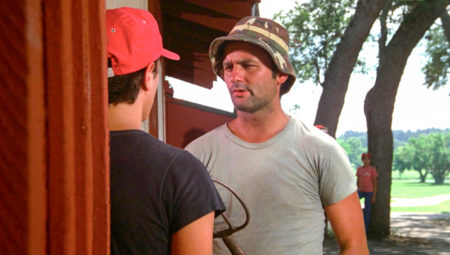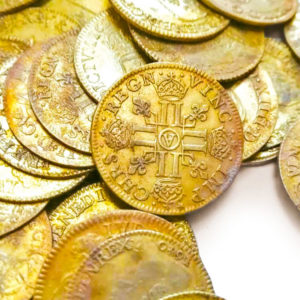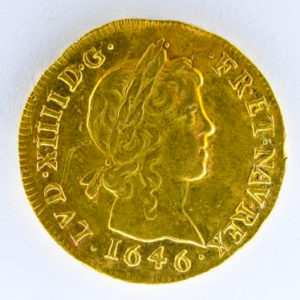“So, we finish the eighteenth and he’s gonna stiff me. And I say, ‘Hey, Dalai Lama, hey how about a little something, you know, for the effort, you know.’ And he says, ‘Oh, uh, there won’t be any money, but when you die, on your deathbed, you will receive total consciousness.’ So, I got that goin’ for me, which is nice.
⏤Carl Spackler
Caddyshack

Click here to watch Bill Murray.
Did You Know?
Did you know that several home builders recently found 239 gold coins while renovating a 13th-century manor located in Brittany, France? They found a metal box hidden inside the wall of a barn. The box contained gold coins and several days later, above a ceiling beam, a purse was found with more coins.
The coins were minted during the reigns of King Louis XIII and his son, Louis XIV. The oldest coin dates to 1638 while the most recent is 1692. The occupants of the manor would likely have been successful merchants or farmers. (The earliest known occupants can only be traced to the 18th-century.) The collection includes some very rare coins including the Golden Louis with Templar Cross, Golden Louis with a long curl, and Louis XIV by the Atelier de Dijon. (About one hundred years later, it would have been Louis XVI without a head⏤ha ha, I couldn’t pass up that one.)
The estimated value of the collection has yet to be established but it is thought to be around US$356,000. The owner of the manor and the contractors will split the proceeds from a future auction.
Schutzstaffel (SS) Race and Settlement Main Office
The SS Race and Settlement Main Office (RuSHA) was the Nazi organization responsible for “safeguarding the racial purity of the SS.” One of its duties was to oversee the marriages of SS personnel (i.e., ensuring the SS man’s fiancée and her parents could trace their Aryan lineage back to 1800) as well as screening all SS applicants for racial purity. It also controlled the settlement of discharged SS men into the occupied eastern European countries. The RuSHA established and operated the Lebensborn network of maternity homes. Another task was to conduct “racial-biological” investigations. Read More The Dalai Lama and the Nazis



